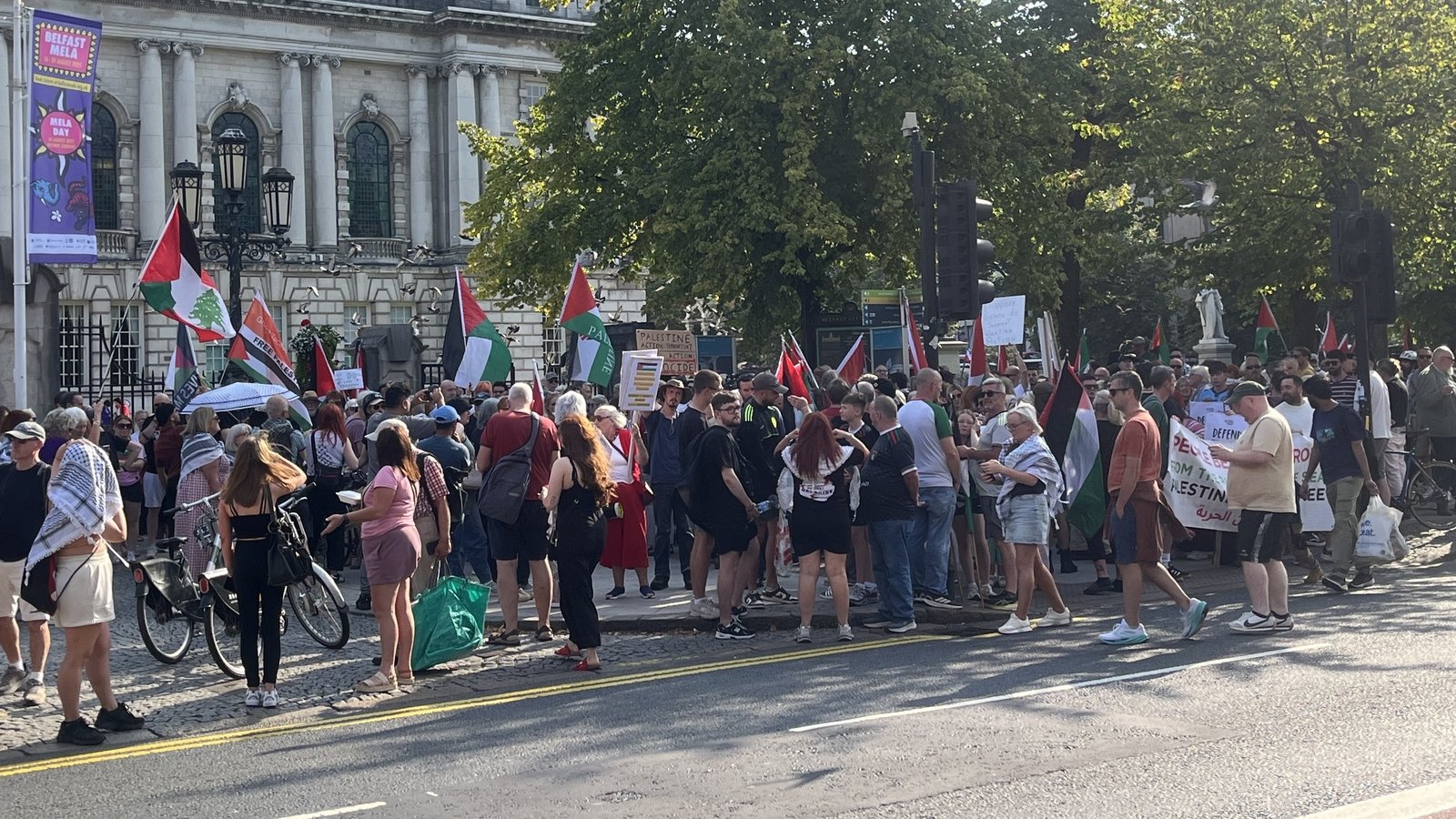Overkill, unenforceable and a nightmare for the PSNI.
The views of some legal experts in Northern Ireland on the British Government’s decision to proscribe Palestine Action as a terrorist group and to make it a criminal offence to express support for it.
Police in England have arrested more than 700 people in recent weeks for wearing Palestine Action T-shirts, while the PSNI has to date arrested just two, despite large numbers attending a rally in Belfast city centre last weekend.
The differing policing responses to amendment of the Terrorism Act 2000 has highlighted once again how Northern Ireland is a unique and hugely complex policing environment.
The bottom line is that if PSNI was to arrest everyone who professed support for a banned terrorist organisation, whether through attending a rally, wearing a T-shirt, erecting a flag, painting a mural or singing a song, the justice system would be overwhelmed.
If they do not routinely arrest and charge people for professing support for the IRA, UVF or UDA, organisations which each murdered hundreds of people, how proportionate is it to arrest someone for wearing a T-shirt bearing the name of an organisation that to date has committed acts of criminal damage?
“Palestine Action has ridiculously been proscribed even though it’s just sort of a civil society organisation as if it had the same status as an armed paramilitary group,” says Daniel Holder, director of the Committee on the Administration of Justice, a Belfast based human rights organisation.
Contrast that with the fact that the largest loyalist paramilitary organisation, the UDA, was not proscribed by the British Government until 1992, despite murdering hundreds of Catholics since its formation in the early 1970s.
Daniel Holder says the PSNI operated a policy of “limited intervention” in dealing with displays of paramilitary flags and indications of support for proscribed organisations because it would be impossible to arrest and charge all of those carrying or erecting such flags.
“There has been a legacy of non enforcement of those types of provisions,” he explains.
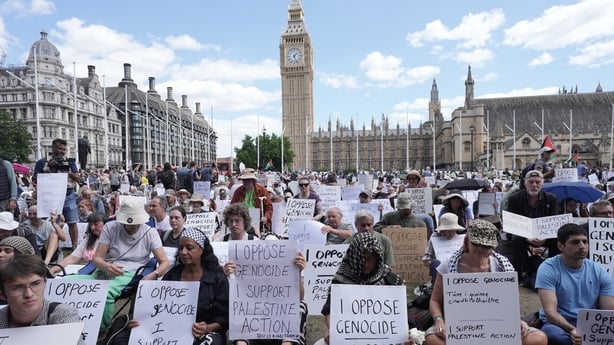
Supporters of Palestine Action taking part in a protest in London earlier this month
“An example is the proliferation of loyalist flags for the UDA and UVF on lampposts and in some parades over many years. The approach there has been one of limited intervention.
“So this legislation regarding Palestine Action has quite serious implications for the PSNI because obviously if they start enforcing the law in a completely different way for a group that isn’t even an armed group when they’re not enforcing it in the same way for groups that are still armed, albeit that are on ceasefire, that puts them in a very difficult position.
“It would raise significant questions around differential treatment.”
Arrests and charges under Section 13 of the Terrorism Act 2000, which criminalises the wearing of an item of clothing or displaying an article in such a way as to arouse reasonable suspicion that the person is a member of or supporter of a proscribed organisation, are unusual in Northern Ireland.
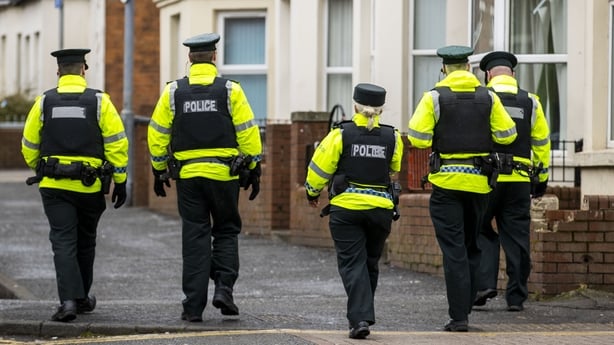
The differing policing responses has highlighted once again how Northern Ireland is a unique and hugely complex policing environment
While police in England have arrested more than 700 people for alleged breaches of Section 13 in recent weeks, the PSNI has referred a total of 188 Section 13 files to the Public Prosecution Service to consider since 2016, around 20 a year. In 94 of the cases the decision was to prosecute.
There are no figures available for the number of convictions, but there have been a number reported.
In April this year, Sean Kelly, who planted the bomb that killed 9 Protestants and an IRA member in the IRA’s Shankill Road bombing in 1993, was fined £300 for wearing a jacket proclaiming support for the IRA.
A month later two members of the INLA were fined under the same legislation.
However, those are exceptions rather than the norm.
“This is absurd in a region festooned with paramilitary symbols, yet the explanation is hardly a mystery,” commentator Newton Emerson pointed out in his column in the Irish News recently.
“We have no realistic way of enforcing a law that would criminalise commemorations, political speeches and cultural events, both loyalist and republican.”
Many of those carrying flags professing support for republican or loyalist groups do not accept that they are terrorist organisations, whatever the law says.
“The policing environment in Northern Ireland is completely unique and different to anywhere else in the UK and that has been remarked upon by many experts over the years,” explains Jonny Byrne, a senior lecturer in criminology at Ulster University, who is regarded as an expert of policing in Northern Ireland.
“The abnormal was normal here and views on what was terrorism were divided, it’s the terrorist or freedom fighter argument and it’s still there.
“We have a history here in terms of music, art, storytelling around what some people perceive as terrorism and others would perceive as martyrdom.”
The same logic could be applied to views on Palestine Action.
Those wearing T-shirts bearing the group’s name would argue that it is not a terrorist organisation, but in their eyes a symbol of opposition to genocide and the mass killings of thousands of Palestinians.
T-shirts and signs held by many of the arrested protestors stated: “I oppose genocide. I support Palestine Action”.
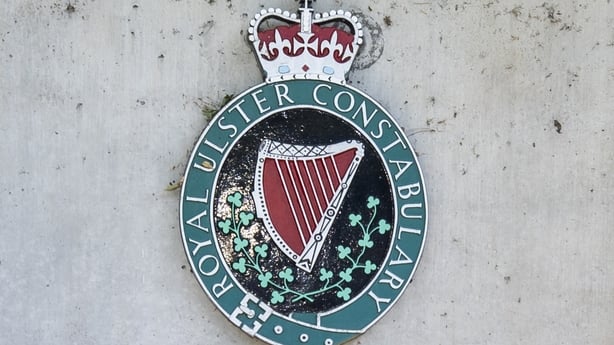
In the eyes of many nationalists and republicans, the RUC was akin to a unionist militia
In addition to differing views on what constitutes terrorism, the PSNI response to the Palestine Action legislation also has to be assessed in the context of the highly controversial history of policing and radical reforms that saw the RUC replaced by the PSNI.
In the eyes of many nationalists and republicans, the RUC was akin to a unionist militia with a clear political agenda.
For many unionists it was an essential bulwark against republican violence aimed at driving Northern Ireland out of the United Kingdom.
While nationalists and republicans welcomed the demise of the RUC and its replacement with the PSNI, many unionists and loyalists viewed it as a betrayal and capitulation to violence.
That history means the PSNI often treads on egg shells.
Operational decisions, actions or lack of them, are scrutinised by politicians, campaigners, community leaders and lawyers to a much greater degree than policing decisions elsewhere in the UK or Ireland.
An independent oversight body, Her Majesty’s Inspectorate of Constabulary, noted in 2021 that the PSNI operates in a complicated social and political environment and “serves a public that is highly alert to fairness and perceptions of disproportionality in policing the different communities.”
That comment was made in a report into the PSNI handling of the funeral of former senior IRA member Bobby Storey in June 2020.
It was attended by around 2,000 people including senior Sinn Féin leaders at a time when Covid regulations placed strict restrictions on numbers attending public gatherings, but there were no arrests or prosecutions.
The report added that: “The policing of all communities in Northern Ireland calls for sensitive relationship building, extensive local knowledge, and a deep understanding of people’s values, traditions and perspectives.”
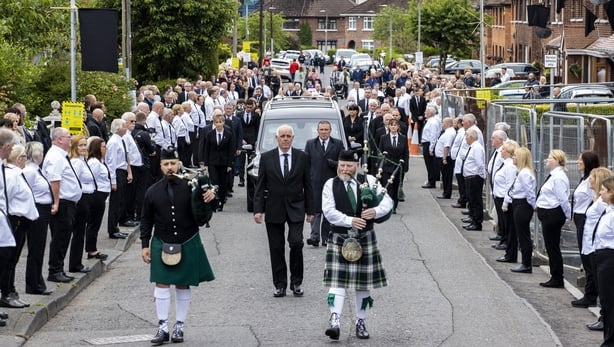
The funeral of former senior IRA member Bobby Storey was attended by around 2,000 people
The observation could be applied to many PSNI operational decisions, including the one last weekend not to move in and make mass arrests at a rally in Belfast like police forces have done in England.
As the HMIC said: “Even if it will attract criticism to do so, the PSNI must sometimes prioritise maintaining public order and protecting people from violence over strict enforcement of the law.”
In assessing the PSNI response to the funeral, the report concluded that whether the approach was justified “is a moral and political question, rather than one of police efficiency and effectiveness”.
So the policing situation in Northern Ireland is widely recognised as unique, and an independent watchdog has put on record that there is a moral and political context to decision making.
“We like to internationalise concepts to our orange and green divide.”
Dr Byrne says the PSNI has a good track record when dealing with public order situations and the art of de-escalation.
That means Northern Ireland may not witness the kind of mass arrest events that have occurred in England as doing so in Belfast or Derry could trigger a wider public and violent backlash.
“Despite what some people might say, the police here are very good at managing public order given their experience,” he says.
“This isn’t their first rodeo. I think they will look at the environment, they will look at the impact of their interventions, they’ll look at the issue of proportionality and they’ll make a judgement call I think on an incident by incident basis.
“Ultimately it’s about proportionality in terms of what proportion of the law should be given over to enforcing the legislation,” Dr Byrne added.
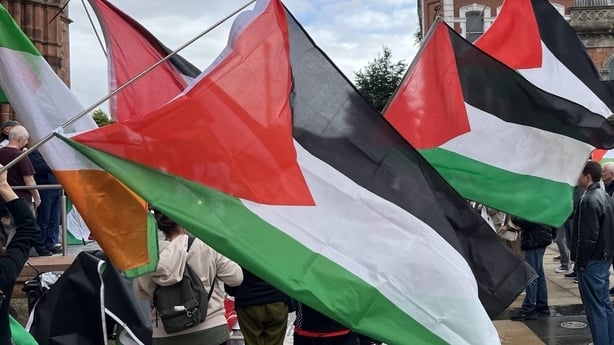
Those supporting Palestine Action are much more likely to come from a nationalist or republican background
“I think that HMIC quote about a moral aspect to policing decisions epitomizes the operating environment.”
The situation is further complicated by the fact that many international events are viewed through the orange and green prism of Northern Ireland’s deeply rooted religious and political divide.
Those supporting Palestine Action are much more likely to come from a nationalist or republican background, with Palestinian flags on lamp posts in many Catholic areas.
The majority of unionists and loyalists are pro-Israel, with the Star of David flying from many lampposts in Protestant areas.
“We like to internationalise concepts to our orange and green divide,” Dr Byrne says.
“It becomes really difficult then. We don’t talk about effective policing, what we talk about, we always look to see, are you policing the other side different to us?”
Professor Kieran McEvoy from the School of Law at Queen’s University believes the proscription of Palestine Action was “overkill” and agrees it has created unique problems for the PSNI, particularly at a time when it’s struggling to attract sufficient numbers of Catholics to join its ranks.
“There have been efforts to develop and improve relations between the Catholic nationalist community and the police, but these relations are delicate and the last thing they need is to be seen to be involved in heavy handed policing against the nationalist, republican community who are sympathetic to the Palestinian cause.
“I think the police here need this like they need a hole in the head.”
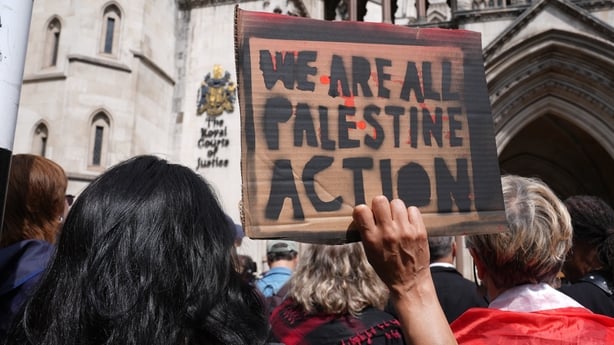
It is a crime to be a member of Palestine Action, one that carries a maximum sentence of 14 years in prison
As RTÉ London Correspondent Tommy Meskill has reported, Labour’s former Northern Ireland Secretary of State Peter Hain voted against the proscription of Palestine Action as a terrorist group, describing it as “intellectually bankrupt, politically unprincipled and morally wrong”.
The Labour peer would appreciate more than most the complex policing environment in Northern Ireland and the unique challenges trying to enforce such a law will entail.
So too should UK Prime Minister Keir Starmer, a former human rights advisor to the Northern Ireland Policing Board.
But Daniel Holder of the Committee on the Administration of Justice suspects the decision was taken without any consideration of the implications for the PSNI.
“I think they paid no attention to the issues here, they just went ahead and rammed through the proscription of a civil society group with no thought about how the legislation would be enforced.”
Read more: Pressure grows on UK govt over Palestine Action ban
To date, the PSNI has sent just one file to the public prosecution service reporting two individuals regarding alleged Section 13 offences in relation to Palestine Action, one of them a 74-year-old woman.
Five others, including well known former civil rights activist and Stormont Assembly member Eamonn McCann, have been sent letters warning of potential criminal charges if they refuse to attend police interviews about their attendance at Palestine solidarity events.
Professor McEvoy says he believes the sending of letters rather than immediate arrests demonstrates that the PSNI is trying to take a low key approach to the issue.
“The police are trying to act with discretion in this matter and trying to find the best place for common sense that they can within their broader legal obligations, common sense ways to apply the law,” he says.
Dr Byrne warns that the way the issue is handled by the PSNI could have ramifications for politics as well as policing.
“There’s the issue around confidence and the legitimacy of the police and how they’re perceived, they’re always trying to stay on the right side of that, and then secondly what happens on the ground can have political implications for Stormont, so there’s that balance that they’re always trying to navigate,” he explains.
The High Court in London has granted the founders of Palestine Action permission to challenge its proscription.
Professor McEvoy hopes the British Government will accept that the legislation was a mistake.
“I think it was a stupid act, it was an overreaction by the Labour Government and there are a lot of misgivings on the Labour backbenches.”
“It needs some common sense, it needs a rethink.”
